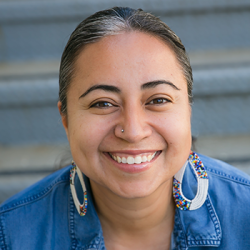
Our world is on fire.
I wish this was a metaphor but as a Northern Californian, this is sadly a literal statement. I am currently locked down in my home due to over 800,000 acres burning nearby causing terrible air quality for the last two weeks. My family sits with anxiety bubbling up for us all, packing our evacuation bags and plotting another exit because my youngest child has asthma.
Right now, fire is my son's most imminent threat but I am constantly living with anxiety, losing sleep at night, thinking about the point at which he will be seen as a threat because of the color of his skin. In the meantime, I hope to instill in him and his brother a deep sense of joy and self-love in a world that will see them as dispensable Black boys.
And of course there is still the pandemic, added to the escalating issues we have to deal with in our world, particularly those of us who are Black and Brown.
Kenosha, Wisconsin is on fire.
Another Black man has been the victim of state-sanctioned violence. Another Black man shot 7 times in the back, yet he had no weapon. Shot 7 times while his three boys sat in the car bearing traumatic witness to this atrocity. Shot 7 times for trying to break up a fight. He is shackled to his hospital bed even while not guilty of any crime or able to walk on his own. I have said this before and I will continue to say it: racism is a national emergency. Jacob Blake. Say his name.
Meanwhile, a white 17-year old, Kyle Rittenhouse travels 20 miles across state lines to support police in Kenosha. He arrives with other white men touting guns and though too young to openly carry in Wisconsin, police don’t question him. Instead they toss water bottles to them. Videos from the scene show police saying “We appreciate you guys. We really do.” He killed two people, seriously wounded a third.
This is just a sliver of the ways in which America reveals itself to us BIPOC folks as a racist, unjust, murderous beast. We’re seeing the resistance. NBA players are exercising their agency to not just “shut up and dribble” anymore. The movement is taking to the streets and demanding justice.
And throughout this we see a harsh juxtaposition in education. Most of our students are continuing with emergency remote learning this fall. On top of this, Black students are facing the cyclical trauma of racism.
The current state of emergency in this country allows educators an opportunity...
To design learning experiences for student agency, which has tremendous power to liberate us, and turn this country away from the tragic legacy of racism. Students should be telling this story right now and moving us towards action. After all, they will be the ones to inherit this all. Are we able to act at these crossroads in a way that can adjust our future course?
If we are to truly seize this moment of protest, social consciousness, and a social awakening to stop these patterns of racism, we must pivot the ways in which learning happens.
Our youth are our biggest hope and though many are out on the streets demanding justice, our response as educators cannot be to have students hop on Zoom day in and out, in an online version of traditional instruction.
This is where PBL comes in: to revolutionize learning and agency for students.
We need to create space for students to explore, discuss and form opinions about current events. These events all have disturbing patterns that must be brought to light by allowing students the opportunity to explore them firsthand. There are so many primary sources students can examine right now: social media, videos, interviews and blogs to name a few. (Though I would add a caution; re-watching videos of violence being done to Black lives can add layers of trauma, so don’t over-focus on visual images.)
Too many times, our instruction as educators has steered away from the difficult, the racist, the courageous conversations. This work will require a paradigm shift; we cannot continue to remain silent or discourage the messy work.
Instead, we must openly and multitudinously examine the intricate webs of how hatred and racism in this country function as part of our institutions. Do the work within yourself, and with students, and facilitate projects connecting deeply with their local communities. This is the power of PBL. It is authenticity, it is connection.
As Chris Emdin told us at PBL World 2020, “If your project ain’t changing the world, it ain’t doin’ nothin.”
Let's make sure that the work of anti-racist projects ends with action.
If a culminating product does not contribute to transformative action for student communities or families, it is not PBL done well enough.
Projects should be calls to revolution. They should work to end gun violence; they should get people out to vote; they should demand accountability for state-sanctioned violence against Black people. They should disrupt power systems in all their manifestations, they should tell stories of the most vulnerable, and they should galvanize our movement to transfer power to Black and Brown people for once in the history of this country.
We need more warriors soon. PBL is the movement in education that can get us there. The very nature of our profession calls for us to make the personal political. To risk not doing so means many more lives will be lost. Let us live.

